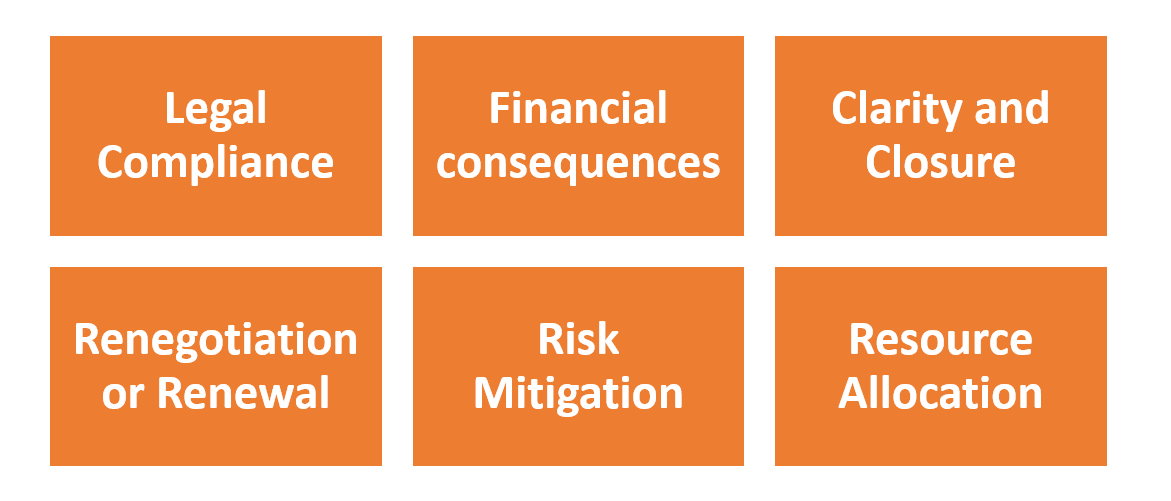
How to Terminate a Contract? Ending or Terminate a contract means stopping an agreement between people or companies. Figuring out when to do this is important, whether it’s for things you buy, services you get, or jobs you have. To end a contract the right way, you look at what you agreed on at the start, check if there’s a way out written in the contract, and follow the steps it says to take. This guide helps you do that properly, making sure the contract is fair for everyone involved. Learning how to end a contract properly helps you do it well, no matter why you’re ending it—like if the work wasn’t good enough, everything got done like it should, or both sides agree to stop.
| Table of Content |
What is a Contract Termination?
Terminating a contract means ending a promise between people or groups. It happens when everyone agrees to stop, someone doesn’t do what they promised, or when everything gets done like they said it would. When someone wants to end it, they check what the contract said originally. They need to follow the rules about when and how to stop, which might mean telling the other person beforehand or doing it by a certain date. Ending a contract can have legal and money consequences, so it’s important to do it right. Whether by mutual agreement or due to specific conditions, understanding and adhering to the contract terms ensure a lawful and orderly conclusion to the contractual relationship.
Why Contract Termination is important?
Contract termination holds significance for several reasons:

- Legal Compliance: By terminating contract in line with its terms, you can guarantee legal compliance and save future disagreements or legal actions.
- Financial consequences: Upon contract closure, it assists in handling financial consequences such as termination fees, reimbursements, or the settlement of overdue payments.
- Clarity and Closure: Appropriately terminating a contract gives both parties clarity regarding their responsibilities, obligations, and the conclusion of their relationship.
- Renegotiation or Renewal: Termination gives parties the opportunity to enter into new agreements, renew existing ones, or revise terms in light of evolving requirements or circumstances.
- Risk Mitigation: Contract termination for non-performance or violation reduces the risks of carrying on with a problematic arrangement.
- Resource Allocation: It permits the reallocation of resources—including people, money, and time—to more advantageous or productive endeavors.
How to terminate a Contract?
Here are the 5 ways contract can be terminated:-
Termination for Convenience
The parties may end the agreement at any time and without cause or penalty by using the termination for convenience clause. The terminating party need not provide evidence of the other party’s violation. Either party may terminate contract at any time by giving notice.
If circumstances change or uncontrollable events occur, a termination for convenience clause gives the participating parties an escape plan to reduce risk and minimize losses.
Termination for Cause
A contract typically includes one or more clauses that allow a party to end the agreement for any reason, including inaction, counterparty breach, or other reasons. When one or more parties fail to fulfill their specified obligations, there has been a breach of contract.
It is typical for there to be small contractual violations that don’t change the terms of the agreement. Contracts may be modified by the parties, and they may contain provisions that permit changes in response to small infractions. However, in the event of substantial breaches, either party may end the agreement and pursue damages for the other party’s violations.
The Date of Contract Termination / The Termination Date
The termination date in a contract is like its expiration day. It’s when the agreement naturally ends, usually after getting the final payment. Once this date arrives, the people involved don’t have to follow the contract rules anymore.
Sometimes, after the termination date, things switch to a rolling contract. That means the contract keeps going, but either party can end it by giving notice, usually a month ahead. This is common in real estate leases. It’s important for everyone to know what happens after the termination date to avoid any money issues.
Breach of Contract
If one party fails to fulfill its obligations as outlined in the contract, the other party may terminate the contract due to the breach. However, this termination should adhere to any specified procedures for termination due to breach within the contract.
Performance
In cases where both parties have completed their obligations as per the terms of the contract, the contract is considered fulfilled or performed, leading to its natural termination.
Common reasons for terminating a Contract
- Termination due to violation: A party’s agreed-upon terms and conditions in a legally binding agreement are violated by a breach of contract. Anything from a late payment to the release of private information could constitute a breach.
- Termination by recession: A recession’s termination is not the same as a contract’s termination. Similar to contract termination, recessionary termination renders the agreement worthless and unenforceable, as if it was never negotiated and signed.
- Mutually agreed-upon termination: The parties to a contract are always free to agree on further terms, such as the ability to end the agreement at any time. When a termination is agreed upon, both parties provide their assent and their duties are discharged.
- Impossibility of performance: Impossibility of performance refers to a situation in which certain events and circumstances prohibit one party from performing under the terms of the contract. Before considering ending your contract, it’s crucial to consider your relationship with your spouse. Renegotiating the terms or taking a different approach could be a better course of action if the relationship is still going strong.
Conclusion
Ending a contract is a big part of any agreement. There are different ways it can happen, like when both sides agree, the time stated in the contract ends, someone doesn’t do what they promised, or when everything’s done as agreed. It’s important for everyone involved to know these ways to end the agreement. Termination offers closure, controls the financial consequences, guarantees legal compliance, and makes it possible to renegotiate or create new agreements. Maintaining connections and reducing the risks involved in terminating an agreement are made easier by clear communication, following the terms of the contract, and having a complete grasp of the termination procedure.
LegalWindow.in is a professional technology driven platform of multidisciplined experts like CA/CS/Lawyers spanning with an aim to provide concrete solution to individuals, start-ups and other business organisation by maximising their growth at an affordable cost. Our team offers expertise solutions in various fields that include Corporate Laws, Direct Taxations, GST Matters, IP Registrations and other Legal Affairs.
Categories
- Agreement Drafting (23)
- Annual Compliance (13)
- Change in Business (37)
- Company Law (150)
- Compliance (90)
- Digital Banking (3)
- Drug License (4)
- FEMA (17)
- Finance Company (42)
- Foreign Taxation (9)
- FSSAI License/Registration (15)
- GST (123)
- Hallmark Registration (1)
- Income Tax (213)
- Latest News (34)
- Miscellaneous (170)
- NBFC Registration (8)
- NGO (18)
- SEBI Registration (6)
- Section 8 Company (10)
- Start and manage a business (27)
- Startup/ Registration (134)
- Trademark Registration/IPR (48)
Recent Posts
All Website Tags
About us
LegalWindow.in is a professional technology driven platform of multidisciplined experts like CA/CS/Lawyers spanning with an aim to provide concrete solution to individuals, start-ups and other business organisation by maximising their growth at an affordable cost.








